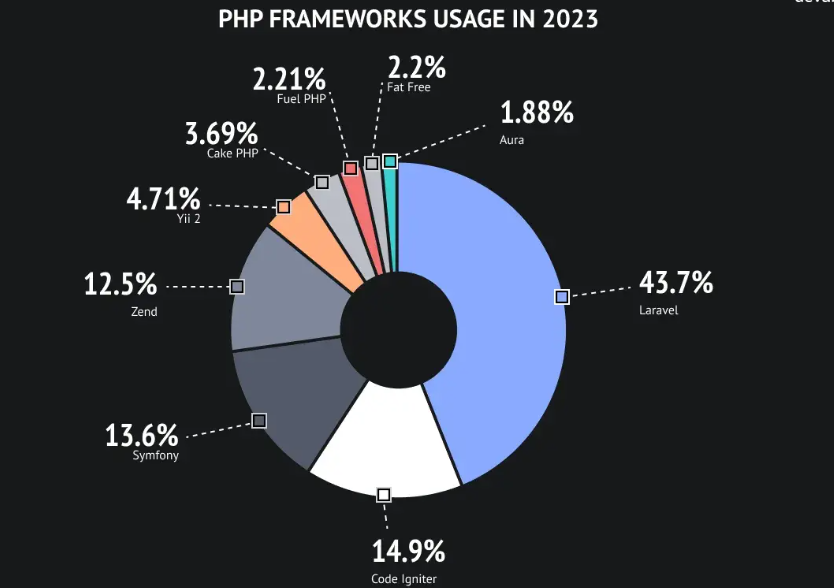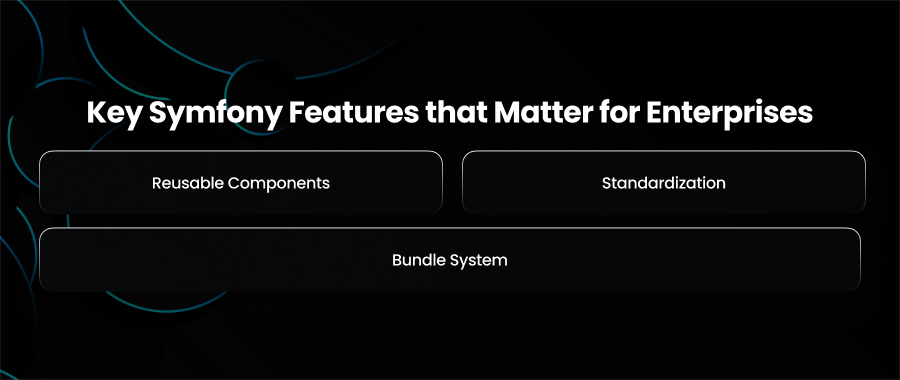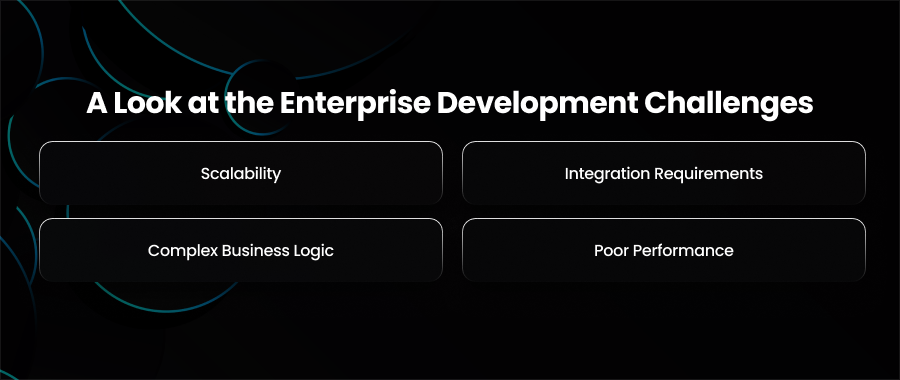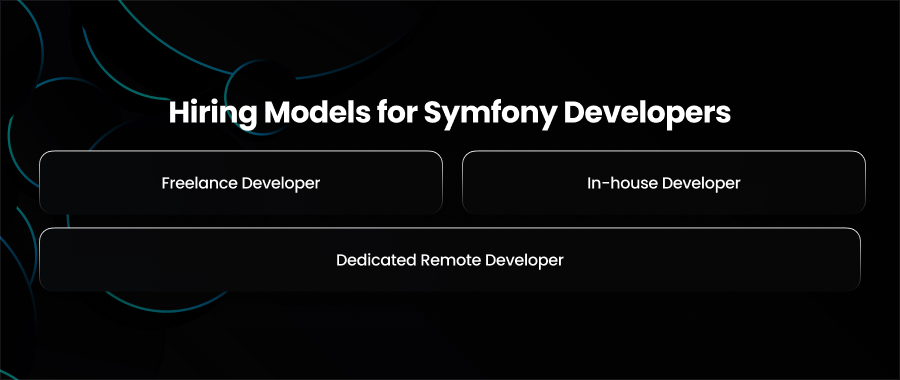Software development has expanded without any boundaries and is no longer limited to building software for inventory, accounting, or administrative tasks. Today, it has become a necessity for startups, small businesses, and large enterprises.
When we talk about enterprise software development, a tech stack name pops up in our mind, i.e., Symfony. It is a powerful PHP framework that is widely used for enterprise application development. According to research, Symfony is the third most popular framework for PHP.

In today’s article, we will let you know why Symfony is the right choice for enterprise software development and what it has to offer you. Moreover, we will take you through the process of hiring Symfony developers to handle your large-scale project.
What is Symfony, and Why Does It Matter in Enterprise Development

On our platform, you must have heard about various PHP frameworks, but not about Symfony. It is an open-source PHP framework that simplifies web application development by offering reusable PHP components, tools, and best practices. If said that it comes in the list of most reliable and widely-used backend frameworks for enterprise application development, it won’t be wrong.
Why Is Symfony Reliable
The reason enterprises rely on Symfony for application development is its flexible and modular design and strong performance. As well, it utilizes the Model-View-Controller structure, making it simple to divide the business functions, appearance, and program flow. Thus, all these things come together and make it an ideal framework for scaling and maintaining large-scale applications.
What Symfony Offers?
Symfony is a reliable web development framework. But rather than trusting us, let’s go through its features that will make you trust what we say:
PHP-Based Framework
Firstly, Symfony has PHP at its back and it comes with a set of tools and components that facilitate the development of enterprise applications. Moreover, PHP makes it compatible with a vast range of web servers and databases.
Modular Architecture
Secondly, you will witness that Symfony follows a modular architecture that allows it to break down the system into smaller, independent, and reusable modules. This allows for easier collaboration, improves maintainability, and makes it easier to update the system.
MVC Pattern
Thirdly, you can manage your code in a structured and organized way using Symfony. It is indebted to the MVC pattern that promotes managing the code in a better way.
Reusable Components
Furthermore, to give you a smooth and friendly development experience, Symfony comes with a large library of reusable components. These components play their role in building various web application features.
Community and Support
When it comes to community and support, worry not, as Symfony boasts a large and active community of developers. These Symfony experts provide resources, tutorials, and top-notch support for users.
Faster Development
Using the reusable components, the development speed increases as you don’t have to code for various things again and again. It is because of the reusable components of Symfony.
Scalability
Moreover, scalability is not an issue as you progress with Symfony development. This framework is capable of handling complex web applications and provides easy scalability to accommodate high traffic influx and data volumes.
Key Symfony Features that Matter for Enterprises

When it comes to enterprise software development, only that framework qualifies that gives the best output with less effort. Here are the features that matter the most for Symfony enterprise application development.
- Reusable Components
Reusable components save you time, which you can spend on building new features, ultimately speeding up the development process. Symfony offers 50+ standalone components that enable developers to build features without the hassle of working from scratch.
- Standardization
There is standardization in Symfony development because it adheres to the PHP standards. This increases code compatibility and collaboration among developers.
- Bundle System
Lastly, Symfony has plugin-like bundles that make it easier for developers to modularize features and scale them independently.
A Look at the Enterprise Development Challenges

Before building an enterprise-level application, you need to understand the challenges that enterprises face. Understanding the challenges, you will be able to craft systems that get rid of them and withstand years of operational demands.
Here are the challenges that enterprises commonly face:
Scalability
Scalability is the first issue that enterprises face. Over time, when the company progresses, its user base grows. This increases the traffic on the systems, which must be handled without system crashing or slowing down. Hence, that’s an issue that many developers ignore during the development phase.
Integration Requirements
Enterprises require integration with various systems such as CRMs, ERPs, payment gateways, etc. This requires smooth integration that won’t fail at the time of high influx.
Complex Business Logic
Remember that an enterprise application is not like a consumer application. It comprises intricate workflows, role-based access, custom rules, and hierarchies that must be implemented with solid care.
Poor Performance
Building a system is not a big deal, but a system with poor performance is of no use for any business. A poorly built application brings downtime often which is equivalent to money lost. Enterprises need solutions that furnish and maintain high uptime, low latency, and strong fault tolerance to ensure business continuity.
Therefore, you need a framework and developers capable of handling the mentioned and unmentioned challenges of enterprise application development. Symfony is capable of tackling all these challenges with built-in tools, architectural flexibility, and strong community support.
What Makes Symfony Ideal for Complex Enterprise Application Development
Symfony is a full-fledged toolkit that addresses the challenges of enterprises. Below are the reasons that make Symfony best for complex applications.
- Modular Component Architecture
- High Performance & Optimizations
- Security
- Long-term Support
- Seamless Integration with APIs and Services
Symfony Developers for Enterprise Application Development
If you are an enterprise or running a business growing rapidly and want to build an application for your system, you should consider choosing Symfony for developing that application. For this, you will have to hire Symfony developers to build a top-notch enterprise application.
Skills to Look for in a Symfony Developer
You need to understand that not every PHP developer is a Symfony developer. A Symfony developer has an understanding of PHP principles as well as Symfony. To ensure that you have a modern enterprise-level application, you need Symfony developers with a deep understanding of the framework and strong software development principles.
Technical Skills – Symfony Developer
When you plan to work with dedicated Symfony developers to build an enterprise-level application, you need to keep an eagle eye on the technical skills of a Symfony developer. Here are the skills that make a Symfony developer a perfect choice for working with a complex enterprise application.
- Symfony Framework: A developer claiming to be a Symfony developer must have top-notch familiarity with the Symfony framework.
- Understanding of PHP: As we know, Symfony is a PHP framework, so a developer must have strong proficiency in PHP.
- Prior Experience with MVC: As Symfony follows MVC architecture, you need to hire a developer with previous working and implementation experience for developing Symfony applications. They must be able to organize their code according to MVC principles.
- ORM Experience: Doctrine ORM is a library that assists developers in interacting with databases and managing database entities efficiently. A good Symfony developer must understand and have experience with the Doctrine Object-Relational Mapping library.
- Template Engine: While hiring Symfony developers, you need to look for developers with proficiency in the Twig templating engine. It is the default templating engine that renders views in Symfony.
- Version Control Systems: Symfony developers should have expertise in dealing with version control systems. It helps them collaborate with team members and manage code effectively.
- Testing and Debugging: Developers must be capable of handling the intricate testing process and possess debugging capabilities to ensure the system runs smoothly and as per functional requirements.
- Knowledge of CI/CD: Lastly, expertise in CI/CD holds extreme significance for Symfony developers as it helps them automate the build, testing, and deployment process of enterprise applications.
Soft Skills for a Symfony Developer
Along with technical skills, a Symfony developer must have core soft skills that matter the most during software development. These skills have the potential to even make or break your project. Hence, when you hire Symfony developers, don’t focal point only on technical skills, ignoring soft skills.
Here is the list of soft skills that your Symfony developer should have.
- Good communication skills
- Problem-solving abilities
- Willingness to learn and adapt to new technologies
- Capable of working in cross-functional teams
- Can work in an agile environment
Hiring Models for Symfony Developers

So, let’s go through the hiring models that you can choose depending on your requirements.
- Freelance Developer
- In-house Developer
- Dedicated Remote Developer
Freelance Symfony Developer
Firstly, the freelance hiring model is the most common hiring model to engage with a Symfony developer. In this model, you only have to surf popular freelance platforms and look for a resource with the required skills and experience.
Once you find a person with the required skill set, contact them and onboard them on your project. It is a budget-friendly option, but has risks of security, compliance issues, and quality of work.
In-House Symfony Developer
Secondly, if you have a physical office space and your team members work there, you have the opportunity to hire an in-house Symfony developer. Hiring an in-house resource ensures that they exclusively work for you without any other commitments.
Though this hiring model is expensive compared to freelance development, it ensures quality of work, data security, and no compliance issues.
Remote Dedicated Symfony Developer
Lastly, we have the option to hire a Symfony developer on a remote basis. In this model, you often hire a developer from different time zones, sometimes the same. The remote developer works dedicatedly on your assigned project and mostly works permanently.
This model is more cost-effective than freelance and in-house developers. Moreover, you have the opportunity to hire a developer from around the world, giving you ample opportunities to hire a highly skilled developer.
How to Hire the Right Symfony Developers
Here is the list of points you need to consider while engaging with a Symfony developer before initiating complex enterprise application development.
- Define your project requirements clearly. Make a list of features and integrations you require.
- Create a detailed job description. It shall include your requirements from the developer, familiarity with technologies, experience level, and soft skills. Moreover, don’t forget to mention what you will deliver to them.
- Review the portfolios and previous work of the potential candidates.
- Conduct technical interviews and assessments. Assess their knowledge of the Symfony framework, MVC and modular architecture, OOP concepts, etc.
- Evaluate communication and collaboration skills.
- Select the best candidate and offer them a handsome salary package.
- Onboard them and start working on your project.
By following all these steps comprehensively, you will be able to turn your complex projects into easier ones.
How Much Does a Symfony Developer Cost?
| Developer Level | Salary/hour |
| Junior Symfony Developer | $19-$35/hour |
| Average Symfony Developer | $35-$75/hour |
| Senior Symfony Developer | $75-$90/hour |
These estimations for hiring Symfony developers are for the USA. The per-hour cost of hiring developers depends on factors like the developer’s skillset, years of experience, etc.
Wrapping Up!
In conclusion, there’s no doubt that building a complex enterprise application is an intricate task, but it can be simplified if you get the assistance of skilled Symfony resources in your team. Hence, building complex enterprise software requires you to have a solid understanding of what you require, your goals, and your timeline. The rest process can be handled by Symfony developers effortlessly.




